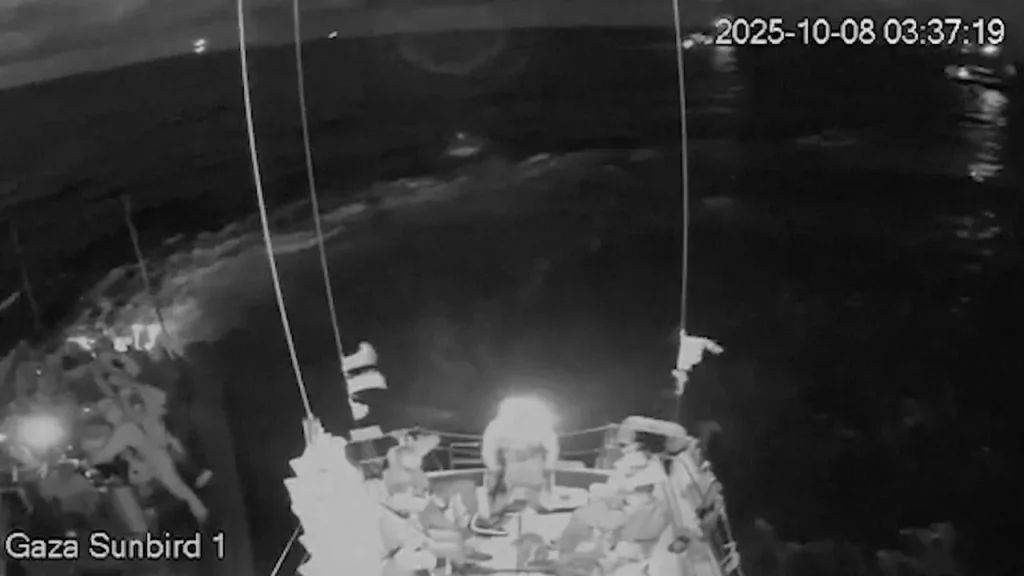Breaking the Blockade: Israel Intercepts Gaza-Bound Aid Flotillas
Israel’s naval forces have once again intervened to prevent humanitarian aid from reaching Gaza by sea, intercepting a nine-vessel flotilla carrying 145 international activists. According to the Israeli Foreign Ministry, this latest attempt to breach the naval blockade was a “futile” endeavor that “ended in nothing.” The ministry reported that all vessels and passengers were safely transferred to an Israeli port, with plans for prompt deportation of the activists. This flotilla, organized by the Freedom Flotilla Coalition & Thousand Madleens to Gaza, reportedly carried over $110,000 worth of critical supplies, including medicines, respiratory equipment, and nutritional supplements intended for Gaza’s struggling hospitals. The organizers aimed to provide direct relief to a population facing severe humanitarian challenges amid ongoing conflict.
This incident marks the second flotilla interception in recent days, highlighting the persistent efforts of international activists to challenge Israel’s maritime restrictions on Gaza. David Heap from the Canadian Boat to Gaza strongly contested Israel’s actions, stating that “Israel has no legal authority to detain international volunteers aboard these ships.” He emphasized that the volunteers should not be criminalized for delivering humanitarian aid or challenging what they view as an illegal blockade, calling their detention “arbitrary” and “unlawful.” The activists maintain that their mission is purely humanitarian, aimed at alleviating suffering in a region where access to essential medical supplies and food has been severely restricted during the ongoing conflict that intensified after October 7, 2023.
Just days earlier, Israeli forces intercepted another aid flotilla known as the Global Sumud Flotilla, which included prominent climate activist Greta Thunberg among its passengers. This interception on October 2 sparked controversy when Israeli authorities claimed the vessels carried no humanitarian aid—an assertion vehemently denied by the flotilla organizers. The organizers described Israel’s claim as “not just verifiably false; it is obscene,” insisting that their boats were “meticulously documented, loaded with medical supplies, food and other life-saving foods for people in Gaza.” This dispute over the cargo’s contents highlights the contentious nature of these maritime humanitarian missions and the differing narratives surrounding them.
For Thunberg, this marked her second attempt to reach Gaza by sea in recent months. After her participation in a June flotilla that was similarly intercepted, Thunberg claimed she had been “kidnapped” by Israel—comments that drew criticism from those pointing to the actual hostages being held in Gaza since the October 7 attacks. According to reports from The Times of Israel citing Adalah, a legal center representing Arab minority rights, Thunberg later told attorneys she could do “more good outside of Israel” and that refusing deportation would “harm our cause.” Her involvement in these maritime missions has shifted her activism from climate change to the Palestinian humanitarian crisis, bringing additional international attention to the situation.
The use of flotillas to challenge Israel’s blockade of Gaza has a controversial history dating back to 2010, when Israeli commandos raided a Turkish ship attempting to reach Gaza, resulting in the deaths of ten activists. Since then, multiple attempts have been made by international activists to break the naval blockade, which Israel maintains is necessary for security reasons to prevent weapons from reaching Hamas and other militant groups. Critics of the blockade argue it constitutes collective punishment of Gaza’s civilian population and has contributed to a humanitarian crisis. The recent flotillas represent continued efforts by international activists to both deliver aid directly and draw global attention to Gaza’s situation through direct action, rather than through the Israeli-approved aid channels.
The flotilla interceptions occur against the backdrop of Israel’s broader military operations in Gaza following the October 7, 2023 Hamas attacks, which have resulted in thousands of Palestinian casualties and widespread destruction of infrastructure. International organizations have warned of catastrophic humanitarian conditions in Gaza, including food insecurity, lack of clean water, and collapsing healthcare systems. While Israel maintains it allows humanitarian aid through designated land crossings subject to security checks, aid organizations report significant challenges in delivering sufficient assistance through these channels. As deportation proceedings begin for the latest group of intercepted activists, the fundamental tensions between Israel’s security concerns and humanitarian imperatives for Gaza’s civilian population remain unresolved, with international activists continuing to seek alternative means to deliver aid to those in need.


